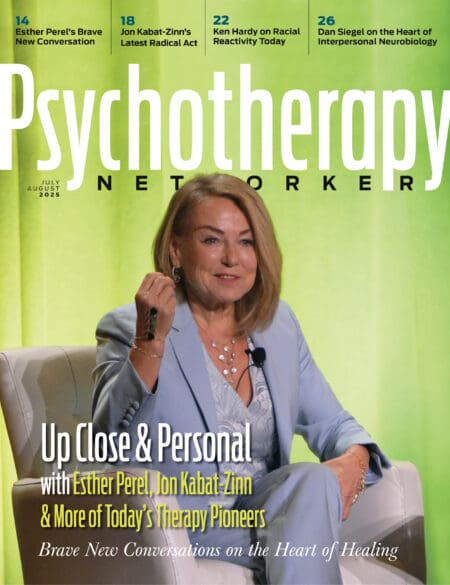Enjoy the audio preview version of this article—perfect for listening on the go.
The summer of 2022 forever changed me, as a therapist and a human being. By this time, I’d completed my master’s in counseling psychology, passed my California licensing exam for marriage and family therapy, finished a PhD program, signed my first book deal, and was running a successful private practice in San Francisco. To many, it seemed like I had it all, but the truth was that I was suffering, something I didn’t quite realize until I attended a retreat for LGBTQ+ Native Americans in Montana near Glacier National Park.
On the final morning of the retreat, I woke up early and walked down to the dock to be alone by the crystal-clear waters of Flathead Lake, where I collapsed onto my back and stared into the bright blue sky as tears streamed down my face. All I could think of was the talent show I’d seen the night before, a delightful lineup of amateur entertainers performing drag numbers, singing, and doing traditional Native American dancing and storytelling. But as I’d watched from the audience, instead of feeling moved or amused, I’d felt envy and regret.
I called my husband, Sean, and told him about this experience. “Sounds like you need to take a break and start making music again,” he said gently. I knew he was right. After 10 years as a singer/songwriter and guitarist, I’d walked away from music to pursue a career in therapy.
As a therapist, I loved helping people heal their trauma, rekindle their relationships, and achieve their creative dreams. I worked long hours building my practice, took on lots of clients, supervised other therapists, and started teaching a graduate psychology course. But dedicating so much time to caring for others and abandoning my own dreams came at a cost: I started to burn out.
My body was tired, and I felt wound up all the time. Then, I developed chronic laryngitis. In the forced solitude that came with each episode, I began to wonder what part of me had been silenced. What stories, songs, or longings had I buried beneath progress notes and treatment plans? If one of my clients was silencing such an integral part of themselves, would I sit back and say nothing? It had been years since I’d sung onstage, but on that clear Montana morning after hanging up with Sean, something began to stir: a melody I hadn’t heard in a long time. A memory, a dream, and a reminder that before I was a therapist, I was someone else.
I didn’t just need a break, I needed to return to who I’d been. I needed a rock-and-roll sabbatical.
Support, Finances, and Fears
When I returned home from the retreat, I told the people closest to me that I needed to take a break from my therapy practice to find myself again, and that I was going to make music, release an album, and go on tour for the first time in 18 years. The plan was to spend 11 months making music and performing, and I gave myself nine months to put that plan into action.
Then, I reached out to several colleagues for support. Each one immediately understood the burnout I’d been feeling, and they all offered to help by being referrals or providing a listening ear if I wanted to talk through any fears or anxieties (and I had many).
One of those anxieties was around my finances. While on sabbatical, I’d still have car payments, mortgage payments, cell phone bills, and other monthly expenses. Not seeing clients meant I wouldn’t be getting a paycheck, and I knew my savings would take a hit. When Sean and I discussed this, we came to an agreement. Because he’d still be working, he’d help with most of the living expenses, but the cost of going on tour, recording a new album, and pressing a vinyl would be on me. Together, we decided that going back to rock and roll was money well spent.
Guilt and Goodbye
I knew I’d be taken care of on my sabbatical, but what about my clients? My greatest worry was that I’d be abandoning people I cared deeply about and who’d come to rely on me for care. They’d shared their sacred experiences, vulnerabilities, and identities with me. We’d built rapport and established trust. I’d been seeing some of them for years, and had sat with them through moments of deep grief and depression, as well as immense joy and hope. The thought of telling them about my sabbatical filled me with guilt, sadness, anxiety, and doubt. Would they understand that this was something I needed to do for myself? Would they think I no longer cared about them or their problems? Would they be angry at me?
And how specific should I be about what I tell them? Should I tell them I planned to follow my passion and return to music? Should I just say I was taking some time off to rest? And how far in advance should I tell them?
When I consulted my trusted colleagues, I received an array of responses about the issue of timing, ranging from giving clients one month to nine months’ notice. I settled on six months, and I decided not to take on any new clients until I returned.
The Script
When it came time to break the news to clients, I had a script prepared: “I want to let you know about a decision I’ve made which will impact our work together. In six months, I’ll be taking a sabbatical from my clinical practice. My plan is to take 11 months off. I have a list of referrals I can give you if you’d like to continue therapy in the interim. Before I return, I’ll send an email letting you know I’m back. You’re under no obligation to return, but I’d be happy to resume our work if you’d like. I’m available to answer questions now or in our next session. Please know this wasn’t a decision I made lightly. I value our time and our work deeply.”
The first time I recited that script to an actual client, I choked up. My client took a deep breath—a skill for regulating difficult emotions we’d practiced together many times. With tears in his eyes, he said, “I’m happy for you.” Then came the follow-up: “What are you going to do?”
There it was: the question I’d known would come. I took a breath and answered truthfully. “I’m taking some time to pursue my creative passions, travel, and spend time with family.”
My client nodded. “Creative passions? Like art?”
“Music,” I replied. “I’ll be working on a project I’ve wanted to do for a long time and going on tour to share it.”
“Wow, I’d love to see you play,” he responded
I wasn’t prepared for this response. How would it feel to have clients see me on stage? For them and for me? I decided I was comfortable with it and said, “I completely understand your curiosity about my life outside of our work together, and I appreciate your interest in seeing me perform. If you choose to attend a show, please remember that all our conversations about confidentiality still apply. As we discussed when we started, I don’t approach clients in public. But you’re always welcome to take the lead and say hello.”
Although most of my other clients were supportive as well, some expressed disappointment, annoyance, and frustration. When I shared my plans with my client Sky, for example, he grew silent and looked out the window.
“Everything okay?’ I asked.
“This always happens to me,” he replied, clearly pained. “I connect with someone and then they leave.”
Over the next six months, we processed what my sabbatical signified to him, and the feelings it stirred up. Two months before my departure date, I gave him my referral list and encouraged him to reach out for continued care. In our final session, he shared his frustration again but said he understood my decision and wasn’t taking it personally. At the close of the session, teary-eyed, we stood in the doorway of my office and said our goodbyes.
A few weeks later, I played a sold-out show at New York City’s Don’t Tell Mama cabaret club, the same place I’d started my music career so many years ago. Taking the stage there felt like a homecoming, and as I looked out into the sea of smiling faces, I knew that it had all been worth it. Any lingering anxiety or doubt I’d felt at the beginning of my sabbatical disappeared, and in that moment, I experienced the vibrant totality of my authentic self: I was a therapist, a rock star, a dreamer, and countless other things, all rolled into one.
I spent the next year recording a new album, going on tour, and enjoying time with family and friends. In my downtime, I noticed I missed my clinical work, but I knew I’d need to do things differently when I returned. I vowed to bring my whole self to my practice, and in doing so, I knew I’d be a different therapist—a better one.
Returning to Therapy
Two months before my sabbatical came to an end, I sent an email notifying my former clients that I’d be returning to my practice, as I’d promised them I would. I reminded them that there was no obligation to resume therapy with me, and that the email was simply a courtesy. Some said they wanted to resume our work. Others sent heartfelt messages of thanks but informed me they were in a good place with their new therapist. It took Sky several weeks to respond to my email, and when he did reach out, it was to say he was doing well without therapy. I wrote back that my door would always be open if he needed me.
It took a while to feel settled seeing clients again. I’d grown accustomed to my leisurely schedule and had to remind myself that I was returning to therapy because I enjoyed it. I focused on the fact that my creative self and my therapist self were one and the same, and after about three months, I found my clinician’s groove again.
A year after taking my rock-and-roll sabbatical, I’ve made some changes to how I practice. By design, my caseload is smaller, because I know that having a full one would lead to burnout, again. And I make time for my music. In fact, I’m about to release a new single and video. And one of my songs was recently nominated for a Native American music award. In the end, I learned that taking a sabbatical didn’t mean I was abandoning my clients or my purpose; it meant I was recommitting myself to both with a full heart.
If you’re considering a sabbatical, I encourage you to follow your heart. Talk it over with family, friends, and trusted colleagues. Decide how long feels right, whether it’s a few weeks or a full year. Review your financial needs and make a plan that supports your time away. Create a referral list for your clients. Give them advance notice so they can process the transition with you. And finally, enjoy yourself.
In our profession, we give and give and give. But rest is not a luxury, it’s a responsibility. Do it for yourself, but also for your clients, colleagues, and community. Show them that taking time for yourself isn’t an indulgence. When you return, you’ll come back not only refreshed and inspired, but with renewed vision and an openhearted energy.
Your sabbatical doesn’t need to look like mine. Yours can involve tending to your garden, cleaning your house, spending time with friends and family, or simply resting. Whatever you decide, I hope it inspires you to live your best life and be in harmony with the world around you. If you can accomplish that, you’re a rock star in my book.
Roger Kuhn
Roger Kuhn, PhD, is a Poarch Creek Two-Spirit Indigiqueer somacultural sex therapist, sexuality educator, writer, activist, and musician. His work explores how culture shapes and informs our bodily experiences. His first book, Somacultural Liberation, is available in paperback and audio, and his music can be streamed on all digital platforms. Contact: www.rogerkuhn.com.











